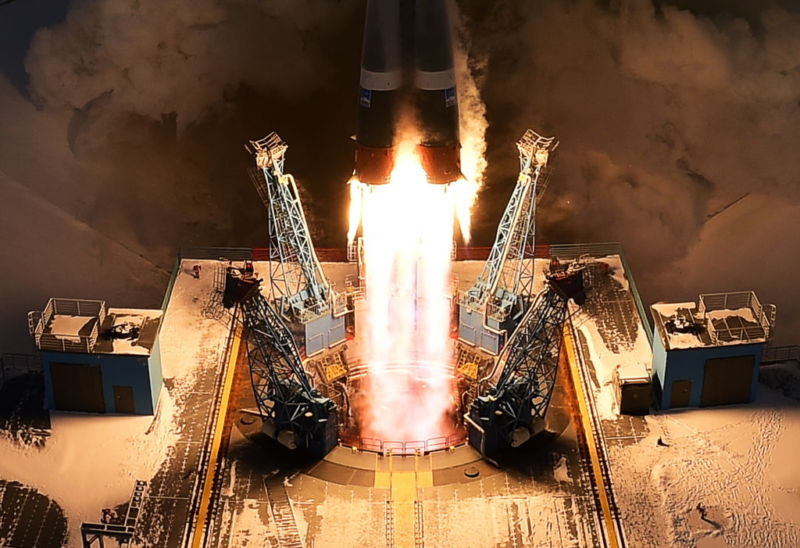SMO fallout —
"This forces us to build a new economy in severe conditions."

Enlarge / A Soyuz 2.1b rocket booster with a Frigate upper stage block, the Meteor-M 2-1 meteorological satellite, and 18 small satellites launched from the Vostochny Cosmodrome.
Yuri Smityuk/TASS
A Progress cargo supply spacecraft launched from the Baikonur Cosmodrome in Kazakhstan early on Thursday, local time. The mission was successful, and Russia has launched hundreds of these spacecraft before. So it wasn't all that big of a deal, except for one small detail: This was just Russia's ninth orbital launch of the year.
At this pace, it appears that the country's space program is on pace for the fewest number of Russian or Soviet space launches in a year since 1961. That was when Yuri Gagarin went to space at the dawn of the human spaceflight era.
There are myriad reasons for this, including a decision by Western space powers to distance themselves from the Russian space corporation, Roscosmos, after the invasion of Ukraine. This has had disastrous effects on the Russian space program, but only recently have we gotten any insight into how deep those impacts have cut.
In recent weeks, the first deputy director of Roscosmos, Andrei Yelchaninov, has given a series of interviews to Russian news outlets. (Most Russian media are state-owned or state-controlled, so none of this information can be independently verified, but it is interesting nonetheless.) One of the most revealing of these interviews was given to national news agency Interfax. It was translated for Ars by Rob Mitchell and provides perspective on Russia's space crisis and how the country will seek to rebound.
A financial crisis
"We are in an ongoing process of emerging from financial crisis, and it’s complicated," Yelchaninov told Interfax. "I would remind you that contract cancellations by unfriendly contacts cost Roscosmos 180 billion rubles ($2.1 billion US). This forces us to build a new economy in severe conditions."
As a result of this, Russia's space industry has been operating at a loss in recent years and may not begin to break even until 2025. Russia's invasion of Ukraine also came as United Launch Alliance finally ended its practice of purchasing RD-180 rocket engines, manufactured by NPO Energomash. This fact, in concert with decreased commercial demand for Russia's Proton and Soyuz rockets, has forced the Russian government to subsidize these elements of Roscosmos.
These companies "are currently in a financial revitalization procedure and have received State subsidies several years ago in order to maintain viability, and are now seeking new sales markets and additional workload," Yelchaninov said. Asked about possibly selling more Russian-made engines to the United States, Yelchaninov replied, "That issue is not on the agenda."
Russia had to look to new sales markets after what Yelchaninov euphemistically refers to as the "special military operation," which is Russia's term of art for its war against Ukraine. "After the beginning of the SMO we were forced to shift from our traditional partners in Europe and the US, with whom we had many years of interaction, for new international directions including the countries in Africa, the Mideast, and Southeast Asia," he said.
During the interview, Yelchaninov confirmed that Russia has committed to participating in the International Space Station program until "at least" 2028. NASA is pushing to extend the operational lifetime of the station to 2030, at which point the United States plans to de-orbit the aging laboratory using a modified Crew Dragon spacecraft.
Rather than working with the United States in space, Yelchaninov said that Russia's space program would focus on cooperation with China rather than competition there. "The key project of our bilateral cooperation is creating an International Lunar Station to which we are jointly striving to attract additional international partners," he said.
Big plans, big delays?
In addition, Russia is also continuing the development of its oft-delayed "Russian Orbital Station," or ROS. The current plans call for the launch of a scientific and power module in 2027, with the core of the station (four modules) to be launched into orbit by 2030. Further expansions will take place in the early 2030s. It should be noted, however, that these dates can charitably be described as aspirational.
Even more speculatively, Yelchaninov mentioned several future rocket projects, including the Amur-LNG vehicle and the Corona rocket.
In 2020, Russia aimed to debut the methane-powered Amur rocket with a reusable first stage by 2026. This vehicle was developed to be cost-competitive with SpaceX's Falcon 9 rocket. Yelchaninov now said Roscosmos intends to develop first-stage reuse in two phases. In the first of these, a Grasshopper-like program would test landing technologies before moving to experiments with a complete booster. But don't expect to see Amur any time soon. Yelchaninov revealed that Russian and Kazakh officials are still in the design phase of a launch site at Baikonur, rather than actively building anything.
Yelchaninov also said Roscosmos would like to develop a single-stage-to-orbit rocket named Corona in the future. This appears to be an updated take on a Russian rocket design that is more than three decades old.
"We have already studied whether or not a new booster of this type will be in demand," Yelchaninov said. "The answer is obvious—we are reducing the cost of access to space by more than an order of magnitude and discovering entirely new opportunities for super-operational delivery of cargo, and we are moving toward an ideology of space as a service."
I would not hold my breath on seeing Corona fly.